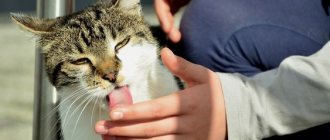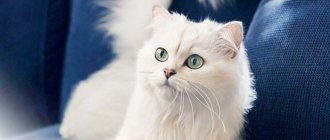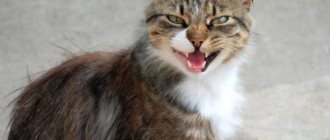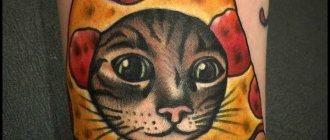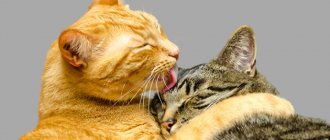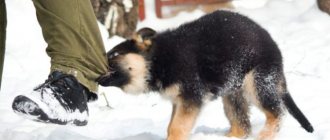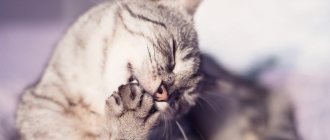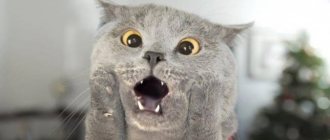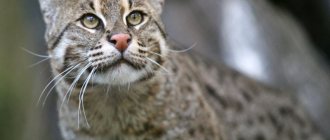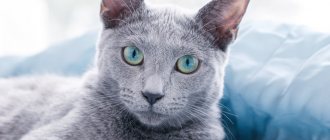When dogs start licking their owners, it's not surprising. However, if cats do the same thing, owners sometimes feel bewildered. In dogs, this behavior is interpreted as an expression of tenderness and devotion, but cats lick people for a variety of reasons. We'll talk about them in our article.
Stress
Sometimes the owner becomes a kind of psychotherapist for the pet. By licking a person's hand, a cat gets rid of stress, which can be a visit to the veterinarian or a tiring trip in a carrier. Contact with the familiar palm of the owner calms the animal and redirects its attention. Often, small kittens lick the hands of their new owners in the first days after weaning from their mother. This is how they get rid of psychological trauma.
Facts about cats and dogs that not everyone knows: 10 examples
The basic Instinct
It's no secret that cats mark the territory they consider theirs by spraying their own urine everywhere. For many people, this becomes a real challenge and the reason that they simply do not get mustachioed pets. Indeed, the unpleasant and extremely pungent smell in the apartment is sometimes stronger than the love for an animal. Fortunately, this can be dealt with, and veterinarians know very well how to stop cats from peeing on furniture, walls, and the owner’s clothes.
However, this is not the only way for these animals to mark their own, or even “beat off” someone else’s. Pheromones that “brand” a cat’s possessions are also secreted with saliva and with the help of sebaceous glands located near the tail, behind the ears, around the mouth and on the head, between the eyes and ears.
This is the whole mystery of why a cat licks its owner and rubs against his legs: she simply leaves her secretions on him. A person will not be able to smell this smell, but other animals (including cats) very well can.
Cats bring this feature into people's lives instinctively - for example, a cat licks its cubs when they return from a walk, not only for the sake of washing, but also to “domesticate” them, to remove foreign, foreign odors from them.
Disease
The reasons for excessive licking are not always harmless. Sometimes this behavior directly indicates the manifestation of diseases.
- Fleas. Working carefully with its tongue, the cat strives to rid not only itself, but its owners of insects.
- Allergic reactions on the skin. Tobacco smell, incorrectly selected shampoo or new products can cause allergies in the form of swelling, discharge from the nose and eyes, and skin rashes. Trying to get rid of discomfort, a furry ward can try to solve the problem by licking himself, and at the same time the owner.
- Malaise. If your pet has not shown affection in this way before, you should be wary. Perhaps this is how the cat wants to draw attention to poor health. In this case, it is better to consult a veterinarian.
- Gum diseases. Old cats with dental problems often experience increased salivation, which leads to constant licking of themselves and all family members.
Making a scratching post for cats with your own hands
Reasons why a cat licks its owner's hands and face
This habit is common to many cats.
But behavior that is mistaken by a person for affection can signal problems in the animal’s life.
- And yet it is love. By licking the face and body, the cat expresses its adoration, this is how the animal takes care of the person and accepts him into its pack. If such manifestations of feelings cause discomfort to the owner, you should not push the pet away, you must act gently but persistently, because on the part of the cat this is really love.
- Pain. Licking oneself and the owner can serve as a symptom of illness. Cats lick their own and other people's bodies to distract themselves from pain. The disease may be indicated by the furry animal’s unpleasant habit of chewing the hair on the owner’s head. One of the common diseases in which a person is subjected to excessive affection from a female is false pregnancy. In this case, consultation with a veterinarian is necessary.
- Stressful conditions. An animal experiencing stress endlessly licks its fur, but does not mind licking the human body. The reasons for stress can be very different - cats are extremely sensitive and do not tolerate change well. the owner should think about the reasons for this behavior, try to exclude them from the animal’s life, and show more attention.
- Attention deficit. Tired licking of the owner's face and body may be a sign of lack of attention. Frequent absences, work until late in the evening, the appearance of a baby in the house leads to the fact that the pet begins to get bored. The cat is not given food in the bowl on time, they stop playing their favorite games, the animal tries in this way to return lost attention to its person. It’s worth trying to find at least a little time to communicate with your cat.
- Smell. Cats have an excellent sense of smell. The aromas of creams, cosmetics, and perfumes on human skin can be pleasant or unpleasant for the animal. The pet tries to get rid of the unpleasant odor with saliva, or the process of licking gives the animal pleasure.
Be sure to read:
Cat habits: what they are, their meaning, what they are, how they affect behavior, features
Taking care of hygiene
By licking their fur, cats follow an ancient instinct associated with getting rid of unnatural odors. If a tailed pet is smeared with medicinal ointment, it will continue to lick the area of the body treated with the medicine for a long time. Sometimes a cat licks a person, wanting to rid him of unpleasant odors, which for the animal are the aromas of soap, perfume, and shampoo.
Hygiene aspects - why is it important for a cat to lick itself
By licking their owner, pets primarily express their affection. However, if the furry inhabitant of the apartment has recently started licking household members, you should watch him. Perhaps this behavior is a symptom of some disease.
Ways to eliminate this habit
If the owner is not satisfied with the pet’s similar habit, then you can try to wean him from this behavior. The following tips will help with this:
- Play with the cat. Sometimes active time together removes the cat’s desire to lick for a long time.
- Apply catnip to your pet's toys. An attractive aroma will distract the cat from its owner, and it will show care on objects that cannot resist.
- The causes of licking need to be taken seriously. However, if it causes a lot of inconvenience, then negative reinforcement can be used. Gently and firmly push your pet away when he tries to lick. Over time, he will realize that all his efforts are in vain.
- If the habit is caused by stress experienced by the cat, then animal psychologists recommend hugging your furry friend more often. This will relieve your cat's anxiety and calm her down.
Finally, I would like to note that under no circumstances should you react sharply negatively to your mustachioed pet’s attempts to lick. This may injure the animal. It is important to understand the reasons why it does this. If the cat was raised by the owner from early childhood, was fed with a pipette and got used to the tenderness of the leader, then you need to come to terms with and calmly treat such affection. In any case, you need to be careful with your pet, because his feelings for his owner are selfless.
Feeling from childhood
Owners know that mother cats tirelessly clean and wash their furry babies. This behavior can be compared to parental kisses and hugs in the human world. Accordingly, the cub learns to give warmth and care.
According to eyewitnesses, a person who feeds a kitten from a pipette and replaces its mother cat often becomes the object of strong reciprocal feelings.
The image of a close being imprinted in infancy and the associated pleasures find their manifestation in subsequent communication. Having become accustomed to having a treasured container of milk in a person’s hands, a grown-up cat will purr, caress, lick and suck fingers, anticipating a hearty meal.
False maternal care
The first emotion a newborn kitten receives is maternal affection. Being blind and deaf, he feels a connection with his mother through tactile touches and then carries these feelings throughout his life. The cat, in turn, licks the kittens' bellies, pursuing other goals - it stimulates digestion and at the same time calms the babies, helping them relax and fall asleep. When a kitten is separated from its mother very early, it instinctively reaches out to a person, transferring its desire for love and care into adulthood.
Animals become especially vulnerable during puberty. If a cat is not sterilized on time and does not give birth, she may develop a so-called false pregnancy. If there is a close attachment to the owner, she has no choice but to “practice” her maternal instincts on a person. Hormonal imbalances often occur in non-castrated cats, which also begin to behave overly affectionately.
Important: in order not to provoke hormonal imbalance and subsequent health problems in your pets, it is advisable to carry out the procedure of sterilization or castration before the age of one year.
Trying to dominate
Wild cats are capricious, cautious and cunning. These qualities were also inherited by their domestic descendants. If a cat licks your hands when you are at your least protected, this demonstrates its desire to dominate. In a similar way, animals demonstrate their dominant position among members of the community.
Such manifestations may indicate the pet’s intention to be higher than you on the hierarchical ladder.
Begging
The answer to a cat's atypical behavior may be hidden in a banal begging for food. In most cases, this manner of communication with the owner is typical for older kittens raised on artificial feeding. They associate human hands with food, so licking and biting palms seems absolutely normal and natural to them. Often, hand licking is accompanied by a movement that imitates kneading of the front paws. The reaction is automatic and reflects the memory of the kitten squeezing milk from its mother's nipples.
Showing love
And yet, no matter how arrogant and isolated cats may be, they also know how to sincerely love their owner! They demonstrate their warm feelings by licking his hands, head and other parts of the body. Therefore, if you are wondering why a cat licks its owner’s face and what it could mean, know: she just loves him!
This method of transmitting positive emotions in purrs is laid down from a very early age, when the mother cat licks her babies, caresses them and takes care of them in every possible way. It has been scientifically proven that animals feel the mood of their owners very well; they are able to empathize with them, be happy and sad with them. Moreover, they also want to receive affection and care in return. But if the owner is in no hurry to show his warm feelings, the cat can easily take the first step and caress his owner, encouraging him to stroke or scratch himself.
Expression of affection
If you've ever observed a group of cats, you've probably noticed that members of the same group lick each other. This phenomenon is called “allogrooming”. Its meaning includes caring for the fur of other individuals of the same group. This phenomenon does not only occur in cats. Through such actions, animals show affection, care, and a desire to strengthen bonds with members of the social group. Such actions help reduce conflict among community members. Living in close contact with humans, the animal perceives people as members of its group.
Cats use allogrooming to demonstrate their affection. In a similar way, cats demonstrate to the owner the desire to be a member of the same community and to have the opportunity to communicate. If the animal is healthy and licks your hands, it means it is attached to you and does not mind closer communication.
How to evaluate such behavior?
In some cases, through a bite, cats demonstrate to their owners that they are sick or experiencing significant discomfort. Whiskers often lick, in particular, painful or damaged areas of the body. When the owner accidentally touches a sensitive area, the pet may bite.
As for biting and licking at the same time, experts are quite optimistic. Some minke whales, while carefully licking loved ones, themselves receive incredible pleasure from the process. When a cat is in pain, she usually hides her ailments from strangers until the last moment. But an attentive owner will still notice something is wrong based on a number of other accompanying signs. And at the slightest suspicion of a disease, it is better to show your pet to a veterinarian. It's much more reliable this way.
Original Post : Why Does My Cat Bite Me And Then Lick Me? Author : Reyna Abraham. Source: cuteness.com Photo: pixabay.com
Friction on legs
The same natural mechanism for cats works with people. When a person comes in from the street, he smells wrong, which means it needs to be fixed. The cat rubs its muzzle against its owner’s legs, licks it, trying to reapply the lost olfactory marker to it.
By the way, the cat’s pheromones evaporate on their own over time, and this explains why the cat licks the owner’s head and other parts of his body, even if he has been at home for a long time and there are no competing individuals nearby. And of course, with the help of friction and licking, the animal attracts the attention of people and shows sympathy for them.
